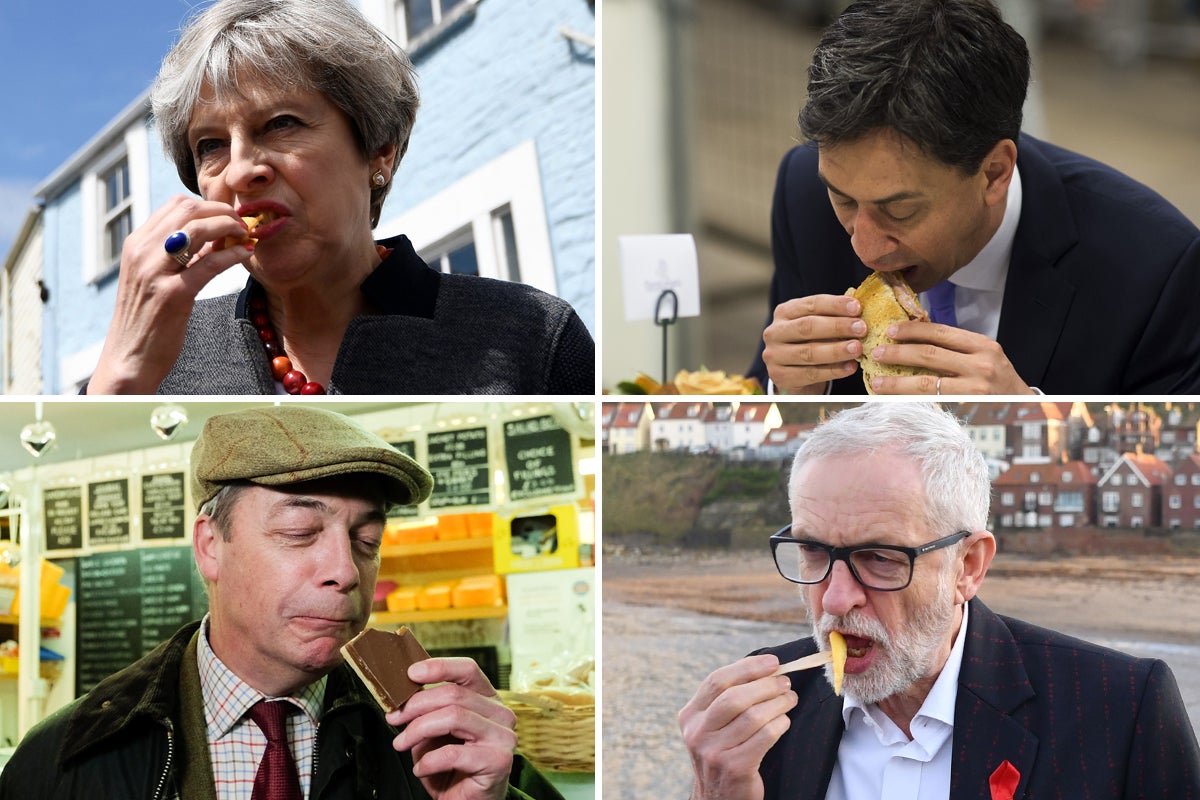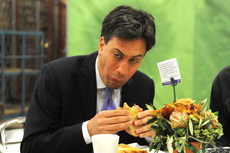Why politicians shouldn’t play with their food
After a government minister added to the lockdown confusion with his take on pasties, Sean O'Grady takes a look back at some of the most famous gastronomic gaffes in British political history


Unlike cold jelly and custard, hot sausage and mustard or pease pudding with saveloys, food doesn’t pair gloriously well with politics. Robert Jenrick, the secretary of state for housing, communities and local government, is only the most recent example of why. The new, well-meaning lockdown rules about pubs and restaurants has provoked a charged debate about what constitutes a “substantial” meal, the serving of which determines whether a tier-three pub, bar or bistro can remain open. A bag of monkey nuts doesn’t, for example. The beef of Old England, roasted on a Sunday lunchtime with the plate heaving with all the trimmings, by contrast, is not just a meal but a symbol of national sovereignty, the means, after all, by which les rosbifs beat Napoleon. But what, Mr Jenrick was asked, about a pasty? Pronouncing on the matter with all the authority that her majesty’s ministers used to apply to the Irish Question, the gold standard or the Versailles settlement, Mr Jenrick judged that, if served with a portion of chips, then a pasty would indeed qualify. Mr Jenrick was not “grilled” on the position of the potato wedge, the delicate status of coleslaw, or if those curly fries you used to get would also be OK in a Covid-secure hostelry. A hot topic, for sure.
So much, then, for the drive to push back the boundaries of state interference in the minutiae of our lives.
Mr Jenrick’s intervention in the pasty debate recalls George Osborne’s ill-starred “omnishambles” Budget of 2012. The then chancellor tried, and failed, to visit austerity into every branch of Greggs in Britain by putting VAT on takeaway hot snacks. His prime minister, David Cameron, tried to jolly things up by declaring himself a pasty lover; alas, as Boris Johnson would say, his claim about buying one at Leeds railway station was soon exposed as a bit of a porkie. “Pastygate” was an assault on every free born citizen’s right to indulge in fat- and salt-packed unhealthy food on the go, and it ran into great resistance, political and definitional. For what is the logic of taxing a hot pasty or a warm one but not a lukewarm or cold one? HMRC used to have a rule about food being at above “ambient temperature”, but what does that mean, say on a freezing cold day? The rules are still more complex now. A current HMRC guidance note is close to self parody, and illustrates well why politicians are wise to avoid getting entangled in interpreting complicated, ambiguous, ill-defined rules (as with most of the Covid regulations). Section VFOOD4240 in the HMRC internal manual gives this worked example:
“A retailer sells a Cornish pasty that has been baked off and then left to cool naturally but is still hot at the time it is provided to a customer (and so the precondition is satisfied). However, the retailer does not intend that the pasty will be consumed hot by the customer (Test 1 is not met); it has not been cooked to order (Test 2 is not met); it has not been kept hot after being cooked (Test 3 is not met); it has been provided to the customer in a standard paper bag (Test 4 is not met) and it is advertised as ‘freshly baked’ (Test 5 is not met). As none of the tests are satisfied, the sale of the pasties are zero-rated.”
All clear?
Ed Miliband, then leader of the opposition, predictably tried to make capital out of the story by going to a Greggs for a sausage roll. Political karma arrived for him when he was photographed grappling with a bacon sarnie in the 2015 election, his face savagely contorted beyond even its usual horsey contours. It was the most obvious bap-based invitation to public ridicule since John Gummer fed his daughter a burger during the BSE crisis in the 1990s.
Plainly, Miliband had forgotten that image of his brother David casually waving a banana around at a Labour conference. Miliband was an unlucky party leader, as was Theresa May, instagrammed by EU boss Donald Tusk with a plateful of cakes and a tagline about cherry picking.
There are other instances of ministers biting off more than they can chew. Liz Truss seems to have a thing about cheese for example. Back in 2014 she raged in a conference speech as environment secretary about the “disgrace” of so much of our cheese being imported, her cold fury at the discovery like that better reserved for the plight of the Palestinians or the Uighur people. Her cheese crusade is unending. She recently almost destroyed her trade deal with Japan by trying to make them eat more Stilton, like a rogue real-life Alan Partridge shoving the delicacy into the face of the Tokyo officials with the battle cry “smell my cheese, you mother”. (The negotiators seem to have compromised by using Wensleydale).
Embarrassing as all this is, thus far only one politician has managed to cripple an entire food industry with one soundbite, which is what Edwina Currie did to egg farming. In 1988 at the height of a salmonella-in-eggs scare she announced that “most of the egg production in thus country, sadly, is affected with salmonella”. Four million hens were promptly slaughtered and “Eggwina” resigned, though her statement was later shown to be nearer the truth than her critics alleged. Nowadays Currie is better remembered for other misjudgements. So, no doubt, will be Robert Jenrick.



Join our commenting forum
Join thought-provoking conversations, follow other Independent readers and see their replies
Comments